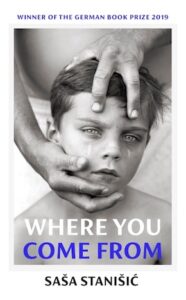Grandmother and get me out of here
by Saša StanišićShe wakes up. Where is she? The sheets feel damp. Wallpaper. Probably a bedroom. Her feet feel hot. Slippers on. She pushes them off. Carpet. Ugly, ugly carpet, she has the same one at home but it’s much nicer. Bookshelf. Brown and white, gilded spines. Books. Tito’s biography. Then Meša Selimović, Abdulah Sidran, Saša Stanišić, and Healing with Tea. Ach, books.
Confusing dreams, confusing, confusing. There was a soldier. A girl. A man who loves her. A gravedigger. All mixed together. Dreams are something alive – and as such fleeting, like the mind. Where did that come from?
Doilies everywhere. On the radio, on the nightstand, on the coffee table. Nice, nice. It’s been a long time since she’s crocheted. At some point the eyes just wouldn’t play along.
What if whoever’s apartment this is comes back? She buttons the top button of her blouse. What is she wearing, anyway? It looks like her own nightgown.
She carefully opens the door. Now she hears something like singing. A kitchen with three doors. Behind the first is the stairwell. Behind the second, the bathroom. She needs to go. Behind the third, the singing. She opens the door. A living room. It’s like she’s been here before. The TV set is singing. A sofa, under a pink blanket, like it’s cold.
The woman on TV isn’t singing very well. They always have to sing and wear high heels. Bad for the hips. How do you turn that thing off ? Ach. Take care of the cord, problem solved.
The best thing would be to just go home. She just has to change first. The clothes in the closet fit. Pack a few things. She knows there’s a suitcase somewhere, here it is.
She wants to turn on the light in the stairwell, but there is no light. What day is it today? Doesn’t matter. The important thing is that it’s not yesterday again.”
Home, the best thing. Yes. Money might be a problem. She opens a few drawers, doesn’t find anything. But there’s a little box with nice jewelry in it. She takes it.
Get out of here. Wait. Almost forgot the comb.
Back home, yes. The key fits. Outside the name on the doorbell is Kristina Stanišić.
But that’s me, she thinks, going down the stairs. This suitcase sure is heavy. Everything’s hard when you’re disoriented. She wants to turn on the light in the stairwell, but there is no light. What day is it today? Doesn’t matter. The important thing is that it’s not yesterday again.
Catching her breath in the yard. The fresh air feels good. Where to now? Everything’s right and wrong, everything’s possible. She closes her eyes and spins on her axis. Once, twice. She laughs, You child! Opens her eyes again. There is a building. She recognizes the grayish-yellow facade. She lives in that building! She wants to turn on the light in the stairwell, but there is no light.
On the fourth floor her name is on the door. The door’s open. She goes in. Puts the suitcase down. Time to unpack, in a minute. First, a coffee.
Extracted from Where You Come From (Jonathan Cape, £16.99)
 Saša Stanišić was born in Višegrad in former Yugoslavia in 1978, moved to Germany when he was fourteen and studied at the Deutsche Literaturinstitut in Leipzig. His novels How the Soldier Repairs the Gramophone and Before the Feast have been translated into more than 30 languages. His novels and stories have been awarded numerous literary prizes. For Herkunft (now published in English as Where You Come From) he received the German Book Prize 2019. Most recently, he was awarded the 2021 Schiller Prize of the City of Marbach. He lives and works in Hamburg. Where You Come From, translated by Damion Searls, is published in hardback and eBook by Jonathan Cape.
Saša Stanišić was born in Višegrad in former Yugoslavia in 1978, moved to Germany when he was fourteen and studied at the Deutsche Literaturinstitut in Leipzig. His novels How the Soldier Repairs the Gramophone and Before the Feast have been translated into more than 30 languages. His novels and stories have been awarded numerous literary prizes. For Herkunft (now published in English as Where You Come From) he received the German Book Prize 2019. Most recently, he was awarded the 2021 Schiller Prize of the City of Marbach. He lives and works in Hamburg. Where You Come From, translated by Damion Searls, is published in hardback and eBook by Jonathan Cape.
Read more
@sasa_s
howtowaitforalongtime
@jonathancape
Author portrait © Katja Sämann
Damion Searls is a translator from German, Norwegian, French, and Dutch and a writer in English. He has written for Harper’s, n+1, and The Paris Review, and has translated the work of authors including Rainer Maria Rilke, Marcel Proust and five Nobel Prize winners. The recipient of Guggenheim, NEA, and Cullman Center fellowships, he is the author of The Inkblots, a history of the Rorschach Test and biography of its creator.
damionsearls.com


